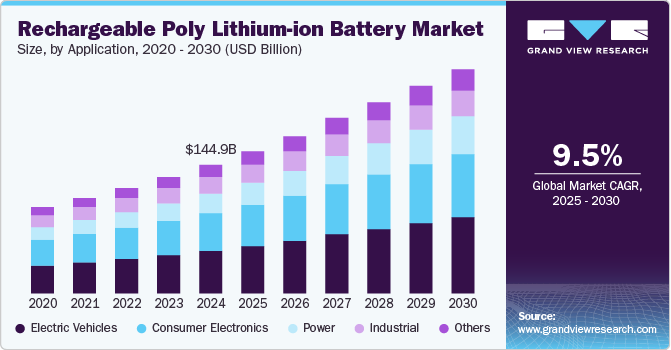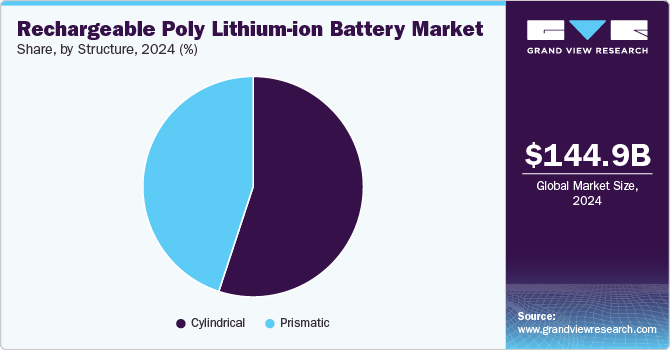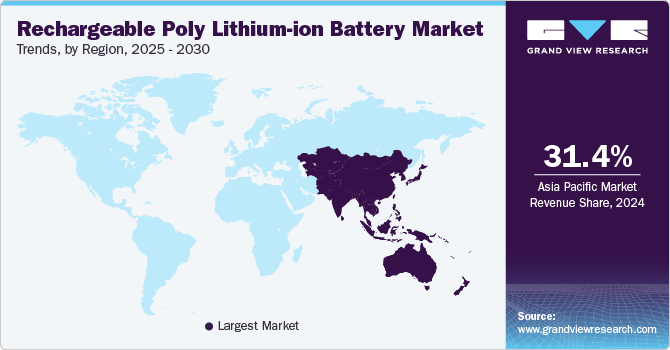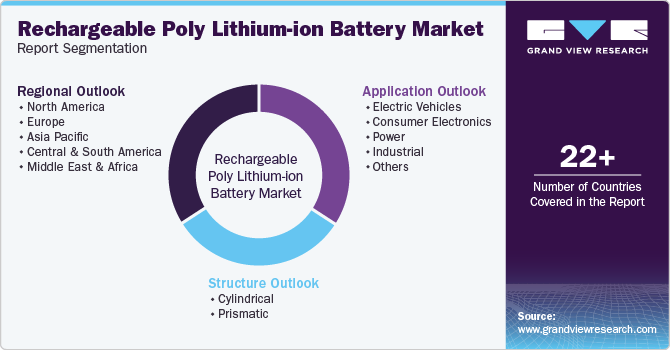
Rechargeable Poly Lithium-ion Battery Market Size, Share & Trends Analysis Report By Application (Electric Vehicles, Consumer Electronics, Power, Industrial), By Structure (Cylindrical, Prismatic), By Region, And Segment Forecasts, 2025 - 2030
- Report ID: GVR-4-68038-777-3
- Number of Report Pages: 110
- Format: PDF
- Historical Range: 2018 - 2024
- Forecast Period: 2025 - 2030
- Industry: Energy & Power
Market Size & Trends
The global rechargeable poly lithium-ion battery market size was estimated at USD 144.99 billion in 2024 and is projected to grow at a CAGR of 9.5% from 2025 to 2030. The market is driven by increasing demand for energy storage solutions across various industries, including consumer electronics, electric vehicles (EVs), and renewable energy systems. These batteries are favored for their high energy density, lightweight design, and longer lifecycle compared to other battery types. The rapid adoption of EVs, spurred by government incentives, stringent emission regulations, and advancements in EV technology, significantly boosts market growth. Additionally, the growing deployment of renewable energy systems, which require efficient storage solutions, further fuels demand. Technological advancements improving battery performance, safety, and affordability also act as key enablers in expanding the market.

The rapid growth of the consumer electronics industry is a primary driver of the rechargeable poly lithium-ion battery market. Devices such as smartphones, laptops, tablets, and wearable gadgets increasingly rely on lithium-ion batteries due to their high energy density, long lifecycle, and lightweight characteristics. As consumer demand for portable, high-performance devices continues to rise, manufacturers are pushing the development of more efficient and durable lithium-ion batteries, fueling market growth.
Another significant driver is the burgeoning electric vehicle (EV) industry. Governments worldwide are implementing stricter emission regulations and offering incentives to promote EV adoption, leading to a surge in demand for lithium-ion batteries. These batteries are critical for EVs due to their superior energy storage capabilities, fast charging potential, and ability to provide consistent power output, making them indispensable in the global transition toward cleaner transportation.
Additionally, the growing adoption of renewable energy storage systems is propelling the market. Lithium-ion batteries are increasingly used in residential and industrial energy storage solutions to manage intermittent energy supplies from renewable structures like solar and wind. Their scalability, efficiency, and ability to provide reliable backup power make them ideal for grid stabilization and energy storage, driving their demand across various sectors.
Application Insights
The electric vehicles segment registered the largest revenue market share of over 33.1% in 2024 and is expected to grow at the fastest CAGR of 10.0% during the forecast period. The electric vehicles (EV) segment is a key driver in the rechargeable poly lithium-ion battery market due to the global push for sustainable transportation and stringent emission regulations. EVs demand high-performance batteries with superior energy density, fast charging capabilities, and extended lifespans, making lithium-ion batteries the preferred choice. Government incentives, advancements in battery technology, and the growing consumer preference for eco-friendly vehicles further accelerate adoption. Additionally, the rapid expansion of EV infrastructure, such as charging stations, and declining battery production costs contribute to the increasing demand for lithium-ion batteries in this segment.
The power segment in the rechargeable poly lithium-ion batteries market is driven by the increasing demand for efficient, lightweight, and high-energy-density solutions across various industries. The growing adoption of electric vehicles (EVs), renewable energy storage systems, and portable electronic devices fuels the need for advanced battery technologies. Additionally, supportive government policies, investments in clean energy infrastructure, and the global push toward carbon neutrality are accelerating the development and integration of lithium-ion batteries in power applications. Continuous advancements in battery chemistry, enhanced charging capabilities, and longer lifecycle performance further bolster their appeal, making them a critical component in modern power ecosystems.
Structure Insights
The cylindrical segment accounted for the highest revenue market share of over 55.0% in 2024 and is expected to grow at a significant CAGR of 8.6% during the forecast period. The cylindrical segment in the rechargeable poly lithium-ion batteries market is driven by its robust design, high energy density, and cost efficiency, making it a preferred choice for various applications. These batteries are widely used in consumer electronics, electric vehicles (EVs), and power tools due to their durability and scalability. The increasing adoption of EVs and renewable energy storage systems has significantly boosted demand for cylindrical lithium-ion batteries, as their standardized form factor facilitates easier integration and manufacturing. Additionally, advancements in materials and cell chemistry have improved their performance and safety, further propelling their market growth.

The prismatic segment in the rechargeable poly lithium-ion battery market is driven by its compact design, high energy density, and suitability for space-constrained applications. These batteries are widely used in consumer electronics, electric vehicles (EVs), and renewable energy storage due to their slim and lightweight form factor, which allows for optimal space utilization. The growing demand for EVs, coupled with advancements in energy storage technologies, has further fueled their adoption. Additionally, increasing investments in renewable energy systems and the push for sustainable energy solutions have bolstered the need for efficient, long-lasting batteries, making the prismatic segment a critical player in the market.
Regional Insights
Asia Pacific rechargeable ploy lithium-ion battery market dominated the global market and accounted for the largest revenue share of 31.4% in 2024. It is expected to continue its dominance over the forecast period. Thus it has led to high awareness among customers regarding sustaining an eco-friendly environment. The customers in this region can afford the product as they have high disposable earnings.

Increasing demand for tablets and mobiles across various countries, including India, China, Thailand, and Japan, is expected to enhance industry development over the forecast period. The push for green energy, urbanization, and rising energy storage needs have further spurred market expansion. Additionally, advancements in battery chemistries and the establishment of large-scale gigafactories are shaping the market landscape, making Asia Pacific a global hub for lithium-ion battery production and innovation. For instance, an increase in lithium-ion battery production capacity in China by various companies, including Panasonic, Amperex Technology Limited, and LG Chem, along with increasing govt. subsidies for electric vehicles are expected to create vast market potential over the projected period.
North America Rechargeable Poly Lithium-ion Battery Market Trends
The North America rechargeable poly lithium-ion battery market is experiencing significant growth, driven by declining battery costs, increased adoption of electric vehicles (EVs), and expansion in renewable energy storage. Government initiatives, such as the U.S. Department of Energy's allocation of $3 billion to 25 battery manufacturing projects across 14 states, aim to enhance domestic production and reduce reliance on imports.
Additionally, strategic partnerships, like General Motors' multibillion-dollar agreement with Vianode for synthetic anode graphite supply, are set to improve EV battery technology and lower production costs. These developments underscore a robust trajectory for the rechargeable lithium-ion battery market in North America.
The U.S. rechargeable poly lithium-ion battery market is experiencing robust growth, driven by increasing demand for electric vehicles (EVs), consumer electronics, and renewable energy storage solutions. The EV boom, fueled by government incentives and stricter emissions regulations, has significantly accelerated battery adoption. Innovations in battery chemistry, aimed at improving energy density, lifespan, and safety, are further shaping the market. Additionally, the rise of smart devices and IoT technologies has created a surge in demand for lightweight, high-performance batteries. Investments in domestic battery manufacturing and recycling initiatives, supported by federal policies, are also key trends, positioning the U.S. as a leader in sustainable energy storage solutions.
Europe Rechargeable Poly Lithium-ion Battery Market Trends
The Europe rechargeable poly lithium-ion battery market is witnessing robust growth driven by the region's push toward electrification and sustainability. Key trends include the rising adoption of electric vehicles (EVs) supported by government incentives, stringent emission regulations, and expanding EV charging infrastructure. The growing demand for renewable energy storage solutions to complement the transition to a low-carbon economy is also fueling the market. Additionally, advancements in battery technologies, including higher energy densities and faster charging capabilities, are enhancing the adoption of lithium-ion batteries in various sectors, including consumer electronics and industrial applications. The establishment of gigafactories and investments in localized battery production further underscore Europe's commitment to achieving energy independence and meeting its climate goals.
Key Rechargeable Poly Lithium-ion Battery Company Insights
The competitive environment of the global rechargeable poly lithium-ion battery market is characterized by the presence of a mix of well-established players and emerging companies, all vying for market share in a rapidly evolving sector. Key players such as Sony, Sanyo, Maxell, Olympus, Motorola, Nippon Chemicals, Kodak, Nikon, and Fujifilm dominate the market with extensive networks, robust technological capabilities, and strategic partnerships.
-
In March 2024, Stryten Energy LLC, announced to launch M-series Li600 Class I, II and III lithium batteries, at MODEX 2024 in Atlanta The battery is based on LFP chemistry and has longer cycle life than other lithium chemistries.
-
In October 2024, CATL launched Freevoy Super Hybrid Battery, to achieve a pure electric range of over 400 kilometers and 4C superfast charging, heralding a new era for high-capacity EREV and PHEV batteries.
Key Rechargeable Poly Lithium-ion Battery Companies:
The following are the leading companies in the rechargeable poly lithium-ion battery market. These companies collectively hold the largest market share and dictate industry trends.
- Sony
- Nikon
- Fujifilm
- Olympus
- Motorola
- 3M
- Koninklijke Philips N.V.
- Kodak
- Maxell
- Nippon Chemicals
- YOK Energy
- Shenzhen Honcell Energy Co. Ltd.
- LiPol Battery Co. Ltd.
Rechargeable Poly Lithium-ion Battery Market Report Scope
|
Report Attribute |
Details |
|
Market size value in 2025 |
USD 160.22 billion |
|
Revenue forecast in 2030 |
USD 252.99 billion |
|
Growth rate |
CAGR of 9.5% from 2025 to 2030 |
|
Historical data |
2018 - 2024 |
|
Forecast period |
2025 - 2030 |
|
Quantitative units |
Revenue in USD billion and CAGR from 2025 to 2030 |
|
Report coverage |
Revenue forecast, competitive landscape, growth factors and trends |
|
Segments covered |
Structure, application, region |
|
Regional scope |
North America; Europe; Asia Pacific; Central & South America, Middle East & Africa |
|
Country Scope |
U.S.; Canada; Mexico; Germany; Russia; UK; Spain; Italy; France; China; Japan; South Korea; India; Australia; Brazil ; Colombia; Paraguay; Saudi Arabia; UAE; South Africa; Egypt |
|
Key companies profiled |
Sony; Nikon; Fujifilm; Olympus; Motorola; 3M; Koninklijke Philips N.V.; Kodak; Maxell; Nippon Chemicals; LiPol Battery Co. Ltd.; YOK Energy; Shenzhen Honcell Energy Co. Ltd. |
|
Customization scope |
Free report customization (equivalent up to 8 analyst’s working days) with purchase. Addition or alteration to country, regional & segment scope |
|
Pricing and purchase options |
Avail customized purchase options to meet your exact research needs. Explore purchase options |
Global Rechargeable Poly Lithium-ion Battery Market Report Segmentation
This report forecasts revenue growth at global, regional, and country levels and provides an analysis of the latest industry trends in each of the sub-segments from 2018 to 2030. For this study, Grand View Research has segmented the global rechargeable poly lithium ion battery market report on the basis of structure, application, and region:

-
Structure Outlook (Revenue, USD Billion, 2018 - 2030)
-
Cylindrical
-
Prismatic
-
-
Application Outlook (Revenue, USD Billion, 2018 - 2030)
-
Electric Vehicles
-
Consumer Electronics
-
Power
-
Industrial
-
Others
-
-
Regional Outlook (Revenue, USD Billion, 2018 - 2030)
-
North America
-
U.S.
-
Canada
-
Mexico
-
-
Europe
-
Germany
-
UK
-
France
-
Russia
-
Spain
-
Italy
-
-
Asia Pacific
-
China
-
India
-
Japan
-
South Korea
-
Australia
-
-
Central & South America
-
Brazil
-
Argentina
-
Paraguay
-
-
Middle East & Africa
-
Saudi Arabia
-
UAE
-
South Africa
-
Egypt
-
-
Frequently Asked Questions About This Report
b. The global rechargeable poly lithium ion battery market size was estimated at USD 144.99 billion in 2024 and is expected to reach USD 160.22 billion in 2025.
b. Key factors driving the rechargeable poly lithium ion batteries market growth include rise in the registration of electric vehicles (EVs) and simultaneously decrease in lithium-ion battery cost is estimated to augment market size over the forecast period.
b. The global rechargeable poly lithium ion battery market is expected to grow at a compounded annual growth rate of 9.5% from 2025 to 2030 to reach USD 252.99 billion by 2030.
b. Asia Pacific dominated the rechargeable poly lithium ion battery market with the highest share of 31.41% in 2024. Growing demand for electric vehicles and grid storage as it offers high-energy density solutions and lightweight are expected to propel the market growth.
b. Some key players operating in the rechargeable poly lithium ion battery market include Sony, Nikon, Fujifilm, Olympus, Motorola, 3M, Koninklijke Philips N.V., Kodak, Maxell, Nippon Chemicals, YOK Energy, Shenzhen Honcell Energy Co. Ltd., LiPol Battery Co. Ltd.
We are committed towards customer satisfaction, and quality service.
"The quality of research they have done for us has been excellent."




